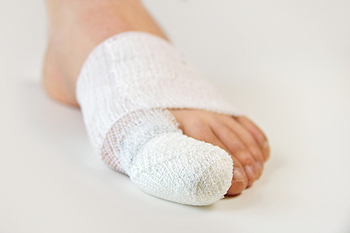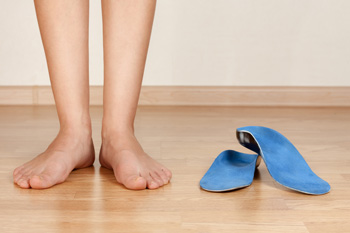Items filtered by date: May 2021
Debunking Myths About Orthotics
Orthotics are inserts that can be placed within shoes for many different reasons. They are designed to treat, manage, or prevent a variety of foot problems from plantar fasciitis to flat foot pain. There are multiple myths surrounding the use of orthotics. Some believe that wearing orthotics can weaken the feet. This is not the case, as orthotics are used to support and return normal function to the feet. It is more likely that not wearing orthotics and continuing to suffer with an injury or biomechanical deficit can damage the feet. Orthotics are often thought of as only being necessary for elderly patients or athletes. While both elderly individuals and athletes can certainly benefit from orthotics, these inserts are worn by people of all ages and abilities. To learn more about orthotics and to determine if they may be right for you, please consult with a podiatrist.
If you are having discomfort in your feet and would like to try orthotics, contact Dr. Steven Sheridan from Ankle & Foot Specialty Clinics. Our doctor can provide the care you need to keep you pain-free and on your feet.
What Are Orthotics?
Orthotics are inserts you can place into your shoes to help with a variety of foot problems such as flat feet or foot pain. Orthotics provide relief and comfort for minor foot and heel pain but can’t correct serious biomechanical problems in your feet.
Over-the-Counter Inserts
Orthotics come in a wide variety of over-the-counter inserts that are used to treat foot pain, heel pain, and minor problems. For example, arch supports can be inserted into your shoes to help correct overarched or flat feet, while gel insoles are often used because they provide comfort and relief from foot and heel pain by alleviating pressure.
Prescription Orthotics
If over-the-counter inserts don’t work for you or if you have a more severe foot concern, it is possible to have your podiatrist prescribe custom orthotics. These high-quality inserts are designed to treat problems such as abnormal motion, plantar fasciitis, and severe forms of heel pain. They can even be used to help patients suffering from diabetes by treating foot ulcers and painful calluses and are usually molded to your feet individually, which allows them to provide full support and comfort.
If you are experiencing minor to severe foot or heel pain, it’s recommended to speak with your podiatrist about the possibilities of using orthotics. A podiatrist can determine which type of orthotic is right for you and allow you to take the first steps towards being pain-free.
If you have any questions please contact our office located in Sandusky, MI . We offer the newest diagnostic and treatment technologies for all your foot and ankle needs.
Relief for Swollen Feet During Pregnancy
 Did you know that during pregnancy, your body produces up to 50% more blood and fluids than usual in order to meet the baby’s needs? This extra fluid often pools in the lower limbs and leads to swelling in the feet, ankles, and legs, which can cause aches, heaviness, and discomfort as you go about your day. If you are experiencing swollen feet and ankles, it may help to elevate your feet several times throughout the day for a few minutes at a time. While your feet are elevated, moving them in small circles and performing other foot and ankle exercises can help move some of that fluid upwards. Other things that may help reduce swelling include limiting your salt intake, sleeping on your left side, staying cool by avoiding hot temperatures, and wearing compression stockings. To learn more about your foot and ankle health during pregnancy, please consult with a podiatrist.
Did you know that during pregnancy, your body produces up to 50% more blood and fluids than usual in order to meet the baby’s needs? This extra fluid often pools in the lower limbs and leads to swelling in the feet, ankles, and legs, which can cause aches, heaviness, and discomfort as you go about your day. If you are experiencing swollen feet and ankles, it may help to elevate your feet several times throughout the day for a few minutes at a time. While your feet are elevated, moving them in small circles and performing other foot and ankle exercises can help move some of that fluid upwards. Other things that may help reduce swelling include limiting your salt intake, sleeping on your left side, staying cool by avoiding hot temperatures, and wearing compression stockings. To learn more about your foot and ankle health during pregnancy, please consult with a podiatrist.
Pregnant women with swollen feet can be treated with a variety of different methods that are readily available. For more information about other cures for swollen feet during pregnancy, consult with Dr. Steven Sheridan from Ankle & Foot Specialty Clinics. Our doctor will attend to all of your foot and ankle needs.
What Foot Problems Can Arise During Pregnancy?
One problem that can occur is overpronation, which occurs when the arch of the foot flattens and tends to roll inward. This can cause pain and discomfort in your heels while you’re walking or even just standing up, trying to support your baby.
Another problem is edema, or swelling in the extremities. This often affects the feet during pregnancy but tends to occur in the later stages.
How Can I Keep My Feet Healthy During Pregnancy?
- Wearing orthotics can provide extra support for the feet and help distribute weight evenly
- Minimize the amount of time spent walking barefoot
- Wear shoes with good arch support
- Wear shoes that allow for good circulation to the feet
- Elevate feet if you experience swelling
- Massage your feet
- Get regular, light exercise, such as walking, to promote blood circulation to the feet
If you have any questions please feel free to contact our office located in Sandusky, MI . We offer the newest diagnostic and treatment technologies for all your foot and ankle needs.
Wounds That Don't Heal Need to Be Checked
What Causes Plantar Fasciitis
 Plantar fasciitis is the most common source of heel pain and is the result of inflammation or a strain of the plantar fascia. The plantar fascia is the flat band of tissue that supports the arch of the foot by running along the bottom of the foot and connecting the heel to the toes. Plantar fasciitis can have a variety of causes. Patients who are obese or have gained weight are susceptible to plantar fasciitis due to the stress the extra weight puts ont the feet. Long distance runners are at a higher risk of developing this condition because of the extreme shock to the heel. Other issues that can lead to plantar fasciitis include a tight Achilles tendon, shoes that don’t fit correctly, a sudden increase in exercise, active jobs, or structural foot problems like flat feet. If you are suffering from heel pain, and you are unsure of the source, a podiatrist will be able to help diagnose and treat your heel pain.
Plantar fasciitis is the most common source of heel pain and is the result of inflammation or a strain of the plantar fascia. The plantar fascia is the flat band of tissue that supports the arch of the foot by running along the bottom of the foot and connecting the heel to the toes. Plantar fasciitis can have a variety of causes. Patients who are obese or have gained weight are susceptible to plantar fasciitis due to the stress the extra weight puts ont the feet. Long distance runners are at a higher risk of developing this condition because of the extreme shock to the heel. Other issues that can lead to plantar fasciitis include a tight Achilles tendon, shoes that don’t fit correctly, a sudden increase in exercise, active jobs, or structural foot problems like flat feet. If you are suffering from heel pain, and you are unsure of the source, a podiatrist will be able to help diagnose and treat your heel pain.
Plantar fasciitis can be very painful and inconvenient. If you are experiencing heel pain or symptoms of plantar fasciitis, contact Dr. Steven Sheridan from Ankle & Foot Specialty Clinics. Our doctor can provide the care you need to keep you pain-free and on your feet.
What Is Plantar Fasciitis?
Plantar fasciitis is the inflammation of the thick band of tissue that runs along the bottom of your foot, known as the plantar fascia, and causes mild to severe heel pain.
What Causes Plantar Fasciitis?
- Excessive running
- Non-supportive shoes
- Overpronation
- Repeated stretching and tearing of the plantar fascia
How Can It Be Treated?
- Conservative measures – anti-inflammatories, ice packs, stretching exercises, physical therapy, orthotic devices
- Shockwave therapy – sound waves are sent to the affected area to facilitate healing and are usually used for chronic cases of plantar fasciitis
- Surgery – usually only used as a last resort when all else fails. The plantar fascia can be surgically detached from the heel
While very treatable, plantar fasciitis is definitely not something that should be ignored. Especially in severe cases, speaking to your doctor right away is highly recommended to avoid complications and severe heel pain. Your podiatrist can work with you to provide the appropriate treatment options tailored to your condition.
If you have any questions please feel free to contact our office located in Sandusky, MI . We offer the newest diagnostic and treatment technologies for all your foot and ankle needs.
Turf Toe Severities
 Turf toe is one of the most common foot injuries among athletes and refers to a sprain of the first metatarsophalangeal (MTP) joint located just below the big toe. When this joint is injured, it also often damages the surrounding ligaments, causing pain when you try to walk, jog, run, or jump. Turf toe can be classified based on how severe the injury is. A mild injury involves minor stretching of one or more ligaments in the MTP joint and is associated with tenderness, discomfort, and mild swelling. A moderate injury involves partial tearing of the ligament or joint capsule and causes pain, swelling, and difficulty walking. A severe injury involves a complete rupture of the ligaments or joint capsule and pain may be severe and make walking impossible. If you have any foot or ankle injuries, please seek the care of a podiatrist.
Turf toe is one of the most common foot injuries among athletes and refers to a sprain of the first metatarsophalangeal (MTP) joint located just below the big toe. When this joint is injured, it also often damages the surrounding ligaments, causing pain when you try to walk, jog, run, or jump. Turf toe can be classified based on how severe the injury is. A mild injury involves minor stretching of one or more ligaments in the MTP joint and is associated with tenderness, discomfort, and mild swelling. A moderate injury involves partial tearing of the ligament or joint capsule and causes pain, swelling, and difficulty walking. A severe injury involves a complete rupture of the ligaments or joint capsule and pain may be severe and make walking impossible. If you have any foot or ankle injuries, please seek the care of a podiatrist.
Sports related foot and ankle injuries require proper treatment before players can go back to their regular routines. For more information, contact Dr. Steven Sheridan of Ankle & Foot Specialty Clinics. Our doctor can provide the care you need to keep you pain-free and on your feet.
Sports Related Foot and Ankle Injuries
Foot and ankle injuries are a common occurrence when it comes to athletes of any sport. While many athletes dismiss the initial aches and pains, the truth is that ignoring potential foot and ankle injuries can lead to serious problems. As athletes continue to place pressure and strain the area further, a mild injury can turn into something as serious as a rupture and may lead to a permanent disability. There are many factors that contribute to sports related foot and ankle injuries, which include failure to warm up properly, not providing support or wearing bad footwear. Common injuries and conditions athletes face, including:
- Plantar Fasciitis
- Plantar Fasciosis
- Achilles Tendinitis
- Achilles Tendon Rupture
- Ankle Sprains
Sports related injuries are commonly treated using the RICE method. This includes rest, applying ice to the injured area, compression and elevating the ankle. More serious sprains and injuries may require surgery, which could include arthroscopic and reconstructive surgery. Rehabilitation and therapy may also be required in order to get any recovering athlete to become fully functional again. Any unusual aches and pains an athlete sustains must be evaluated by a licensed, reputable medical professional.
If you have any questions please feel free to contact our office located in Sandusky, MI . We offer the newest diagnostic and treatment technologies for all your foot and ankle needs.


